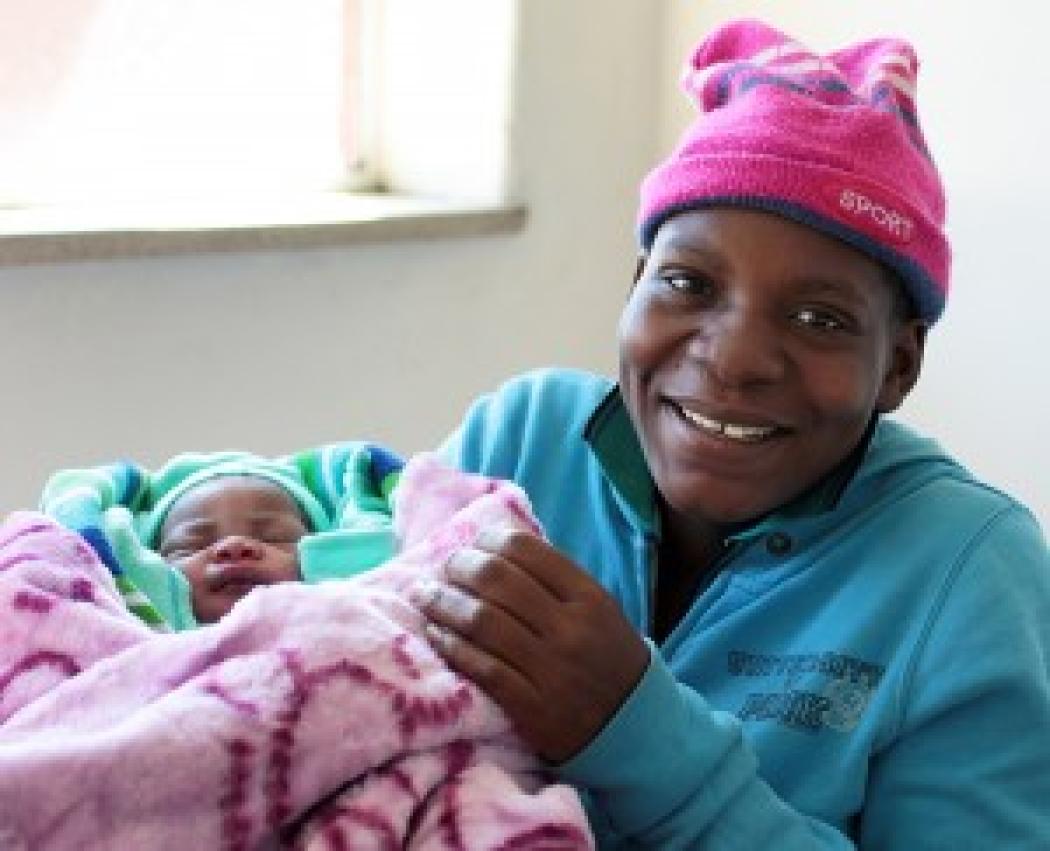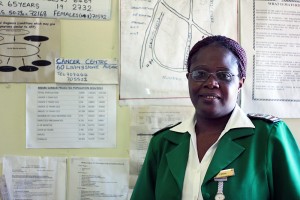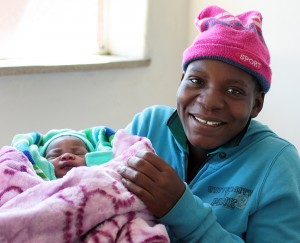A Healthy Mother, a Healthy Father, and an HIV-free Baby, Thanks to Frontline Health Workers

By Heather Mason, Special Correspondent for the Elizabeth Glaser Pediatric AIDS Foundation
“All roads lead to Mbare,” says Sister Inviolater Wilson, the nurse in charge of maternity at Edith Opperman Hospital in Mbare, outside the capital city of Harare, Zimbabwe. Mbare is a high-density township often referred to as the “Soweto of Harare.”

Sister Inviolater Wilson manages a busy maternity ward with a transient population, putting her on the front line for ending HIV in children and keeping their mothers alive. Photo by Heather Mason for the Elizabeth Glaser Pediatric AIDS Foundation, 2014.
Edith Opperman Hospital is the only health facility in Harare’s Southern District that has a maternity ward. Because of its central location and proximity to a bus terminal, clients come from all over Zimbabwe—and all over southern Africa—to deliver their babies at Edith Opperman. The maternity ward here averages 450 deliveries per month—15 to 20 deliveries per day.
HIV prevalence in the maternity ward is about 13 percent, and health workers like Sister Wilson are doing everything they can to help women living with HIV, deliver babies who are HIV-free. Thanks to support from the Elizabeth Glaser Pediatric AIDS Foundation (EGPAF) and the Children’s Investment Fund Foundation (CIFF), HIV counseling, testing, and treatment have been integrated into antenatal and maternity care at the clinic. Under the national lifelong treatment initiative, called Option B+, all pregnant women who test positive for HIV are immediately placed on antiretroviral therapy (ART), and it is recommended that they remain on ART for life. This initiative is key to prevention of mother-to-child transmission of HIV.
And thanks to the scale up of Option B+ and other prevention of mother-to-child transmission of HIV programs, Zimbabwe is on track to be one of the first countries in sub-Saharan Africa to achieve virtual elimination of mother-to-child transmission of HIV. In just five years the rate of mother-to-child transmission has decreased from 30 percent to 6.7 percent and continues to fall.
“We are now enrolling more clients on ART, which is quite good for them,” says Sister Wilson. “But we are facing some challenges, because these people are not [feeling] sick and they test positive and are told they need to take drugs every day, from now.”
Under Option B+, male partners of pregnant women who test positive for HIV also have the option of initiating onto ART. Sister Wilson has seen an increase in male involvement as a result.
“Women are encouraging their partners to come,” Sister Wilson says. “It’s quite easy to take your drugs if your partner knows your status. Disclosure is getting easier and easier for the woman.”

A newborn at Edith Opperman Hospital has a great shot at a long and healthy life thanks to the dedicated nursing staff and prevention of mother-to-child transmission of HIV. Photo by Heather Mason for the Elizabeth Glaser Pediatric AIDS Foundation, 2014.
But the best thing about Option B+, according to Sister Wilson, is that the program considers the needs of the entire family.
“We used to look after the baby more than the mother. We wanted the baby to be HIV negative, but who was going to look after that negative child, when the mother remains positive and is not on any drugs? So we want a healthy mother, and a healthy father, with a baby who is HIV-free. The prevention of mother-to-child transmission of HIV program is looking after everyone, the whole family, unlike when we used to look after the baby only.”
As advocates on World AIDS Day this week remembered those lost and rededicated themselves to achieving an AIDS-free generation, Sister Wilson continues to deliver an important message for pregnant women and their partners who are hesitant to come to the clinic and test for HIV.
“There’s life after being diagnosed HIV-positive. There’s life for you, your partner, and your baby. We are here for you. The program is open. And please come and book early, we want to protect the baby while it’s in the uterus, during delivery, and during breastfeeding.”
The Elizabeth Glaser Pediatric AIDS Foundation (EGPAF) has provided more than 23 million women with prevention of mother-to-child transmission of HIV (PMTCT) services.
To learn more about frontline health workers in Zimbabwe, watch Zimbabwe Nears the Virtually Elimination of Mother-to-Child Transmission of HIV. To learn more about EGPAF’s work to end AIDS in children visit www.pedaids.org.
